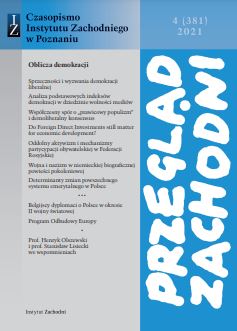O RODZINNEJ (NIE)PAMIĘCI - WOJNA I NAZIZM W NIEMIECKIEJ BIOGRAFICZNEJ POWIEŚCI POKOLENIOWEJ
MEMORY AS DISCOURSES OF CONFLICT AND RECONCILIATION. NAZISM IN BIOGRAPHICAL GENERATIONAL NOVEL
Author(s): Gerda NogalSubject(s): Military history, Social history, Recent History (1900 till today), Family and social welfare, Fascism, Nazism and WW II, Politics of History/Memory
Published by: Instytut Zachodni im. Zygmunta Wojciechowskiego
Keywords: war and Nazism; post-war generations; family memory; collective memory;
Summary/Abstract: In Dagmar Leupold’s „Nach den Kriegen” and Stephan Wackwitz‘ „Ein unsichtbares Land”, novels of second and third generation, narrators come back to the times of Nazism, Holocaust and wars as the components of family memory. The article focuses on social, especially family conditions of memory. The starting point is the assumption that family conditions exert a significant impact on the construction of memories in the discussed novels. Analysis has shown that both texts markedly transpose the mechanisms of loyalty of family memory transmission, also critically reflecting on them from the perspective of the present. By putting memories in the context of indirect family memory the writers strive for the truth about the past but also adopt an affirmative attitude with regard to its „participants”. This attitude certainly derives from the leading humanistic thoughts of western cultures, harmonised with the social, cultural and political system based on democracy and Europeanness.
Journal: Przegląd Zachodni
- Issue Year: 381/2021
- Issue No: 04
- Page Range: 99-112
- Page Count: 14
- Language: Polish

